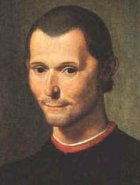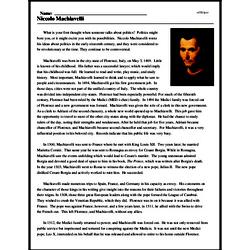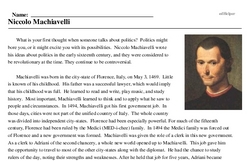Niccolo Machiavelli
Niccolo Machiavelli
Reading Comprehension for May 3
What is your first thought when someone talks about politics? Politics might bore you, or it might excite you with its possibilities. Niccolo Machiavelli wrote his ideas about politics in the early sixteenth century, and they were considered to be revolutionary at the time. They continue to be controversial.
Machiavelli was born in the city-state of Florence, Italy, on May 3, 1469. Little is known of his childhood. His father was a successful lawyer, which would imply that his childhood was full. He learned to read and write, play music, and study history. Most important, Machiavelli learned to think and to apply what he saw to people and circumstances. In 1494, Machiavelli got his first government job. In those days, cities were not part of the unified country of Italy. The whole country was divided into independent city-states. Florence had been especially powerful. For much of the fifteenth century, Florence had been ruled by the Medici (MED-i-chee) family. In 1494 the Medici family was forced out of Florence and a new government was formed. Machiavelli was given the role of a clerk in this new government. As a clerk to Adriani of the second chancery, a whole new world opened up to Machiavelli. This job gave him the opportunity to travel to most of the other city-states along with the diplomat. He had the chance to study rulers of the day, noting their strengths and weaknesses. After he held that job for five years, Adriani became chancellor of Florence, and Machiavelli became second chancellor and secretary. For Machiavelli, it was a very influential position in his beloved city. Records indicate that his public life was very busy.
In 1500, Machiavelli was sent to France where he met with King Louis XII. Two years later, he married Marietta Corsini. That same year he was sent to Romagna as envoy for Cesare Borgia. While in Romagna, Machiavelli saw the events unfolding which would lead to Cesare's murder. The young statesman admired Borgia and devoted a good deal of space to him in his book, The Prince, which was written after Borgia's death. In the year 1503, Machiavelli went to Rome to witness the election of a new pope, Julius II. The new pope disliked Cesare Borgia and actively worked to ruin him. He succeeded.




